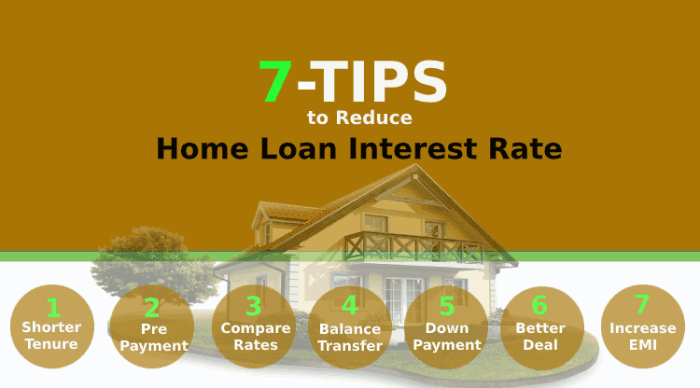How to reduce interest on loans takes center stage in the financial world. Get ready to dive into the secrets of lowering those pesky interest rates with some cool strategies and tips that will have you feeling like a financial guru in no time.
From understanding how interest rates work to improving your credit score and exploring loan repayment options, this guide has got you covered with everything you need to know.
Understanding Interest Rates

Interest rates play a crucial role in loans as they determine the cost of borrowing money. When you take out a loan, you agree to pay back the amount borrowed plus the interest charged by the lender.
Factors Affecting Interest Rates
Several factors can influence the interest rate you are offered on a loan:
- The current economic conditions: Interest rates tend to rise when the economy is doing well and fall during economic downturns.
- Your credit score: Lenders use your credit score to assess your creditworthiness. A higher credit score typically results in a lower interest rate.
- The type of loan: Different types of loans, such as mortgages, car loans, and personal loans, may have varying interest rates based on the lender’s risk.
- The loan term: Shorter loan terms usually come with lower interest rates compared to longer loan terms.
Fixed vs. Variable Interest Rates
Fixed interest rates remain the same throughout the life of the loan, providing predictability in monthly payments. On the other hand, variable interest rates can fluctuate based on market conditions, potentially resulting in lower initial rates but higher payments later on.
Strategies to Reduce Interest on Loans
When it comes to reducing interest on loans, there are several strategies you can consider to save money in the long run. From negotiating with lenders for lower rates to making extra payments towards the principal amount, these tactics can help you pay off your loan faster and with less interest overall.
Negotiating with Lenders for Lower Interest Rates
One effective way to reduce the interest on your loans is to negotiate with your lender for a lower interest rate. If you have a good payment history or if interest rates have dropped since you took out the loan, you may have some leverage to request a rate reduction. Be prepared to make a case for why you deserve a lower rate and be persistent in your negotiations.
Refinancing to Lower Interest Rates
Another option to consider is refinancing your loan to secure a lower interest rate. By refinancing, you can replace your current loan with a new one that has better terms, potentially saving you money on interest over the life of the loan. Keep in mind that there may be costs associated with refinancing, so be sure to weigh the potential savings against any fees.
Making Extra Payments Towards the Principal Amount
One of the most effective ways to reduce the amount of interest you pay on a loan is by making extra payments towards the principal amount. By doing so, you can decrease the outstanding balance and reduce the total interest that accrues over time. Even small additional payments can add up and make a big difference in the long term, helping you pay off your loan faster and save money on interest.
Improving Credit Score
To qualify for lower interest rates on loans, it is crucial to have a good credit score. Your credit score is a numerical representation of your creditworthiness, with higher scores indicating lower risk for lenders. Here are some steps to improve your credit score and secure better loan terms:
Pay Your Bills on Time, How to reduce interest on loans
- Set up automatic payments or reminders to ensure you never miss a payment.
- Even one late payment can significantly impact your credit score, so strive to pay on time every month.
Reduce Your Debt
- Work on paying down your existing debt, especially high-interest credit card balances.
- Lowering your credit utilization ratio can improve your credit score.
Check Your Credit Report Regularly
- Monitor your credit report for errors or fraudulent activity that could be dragging down your score.
- Dispute any inaccuracies with the credit bureau to have them corrected.
Avoid Opening Too Many New Accounts
- Each new credit inquiry can temporarily lower your score, so be mindful of opening multiple accounts in a short period.
- Focus on building a positive credit history with your existing accounts.
Loan Repayment Options: How To Reduce Interest On Loans
Paying back loans can be a daunting task, but understanding the different repayment options available can help you manage your debt more effectively.
Bi-Weekly Payments
- Bi-weekly payments involve making payments every two weeks instead of once a month.
- This results in 26 half-payments annually, which is the equivalent of 13 full monthly payments.
- By making bi-weekly payments, you can reduce the overall interest paid on the loan and shorten the repayment period.
- It’s essential to check with your lender if they offer this option and if there are any additional fees associated with it.
Early Repayment of Loans
- Early repayment of loans refers to paying off the loan before the scheduled term ends.
- One of the primary benefits of early repayment is saving on interest payments over the long run.
- By paying off the loan early, you can reduce the total amount of interest paid and potentially improve your credit score.
- However, some loans may have prepayment penalties, so it’s crucial to check with your lender before making early payments.
